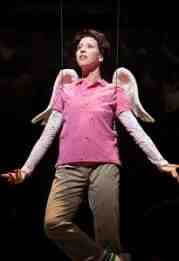David Daniels Thrills in Orfeo ed Euridice
Metropolitan Opera Revives Mark Morris Production
By: Susan Hall - May 06, 2011
Orfeo ed Euridice
by Christoph Wilibald Gluck
Libretto by Ranieri de Calzabigi
Conductor Anthony Walker
May 4, 2011
Metropolitan Opera
Orfeo David Daniels
Euridice Kate Royal
Amor Lisette Oropesa
Production Mark Morris
Set Designer Allen Moyer
Costume Designer Isaac Mizrahi
Lighting Designer James F. Ingalls
Choreographer Mark Morris
Like Mark Morris, who created the show, the Metropolitan Opera’s production of Orfeo and Euridice is fun. And why shouldn’t it be? Just because Orfeo, a musician, is devastated when a snakebite kills his wife? Surely not. After all the great comics Imogene Coca and Sid Caeser appeared in the Boston Opera’s production of Offenbach’s Orpheus in the Underworld.
The Orfeo myth has been a staple of opera for hundreds of years. Gluck made the ancient myth’s ending a happy one. In recent years, only Wolf Siegfried Wagner has found it necessary to return to a sad conclusion.
Before Gluck wrote, one singer performed at a time. The stage was filled with members of the prima donna’s family, her mother, maidservants and admirers, all armed with mirrors, smelling salts and combs to restore the singer in between arias.
The Met’s costume designer Isaac Mizrahi has replaced this group with a three-tiered ampitheater filled with figures from the past who cheer Orfeo on as he journeys to retrieve Euridice from Hades. The Met chorus, dressed as Abraham Lincoln, Gandhi, Jackie O, King Henry VIII, Marie Curie, Charlie Chaplin, Cleopatra, Liberace (you find the rest!) is now the onstage audience. When operagoers come in pairs, one an enthusiast, the other cooperative, everyone has something to enjoy.
David Garrick’s acting techniques were introduced at about the time Gluck composed and more than one emotion began to be presented. The first Orfeo had been a student of Garrick’s. Gluck’s music is drop dead gorgeous.
The Met has had two superb singers in the Orfeo role, first America’s pre-eminent counter-tenor, David Daniels, who returns this spring. It has been a particular pleasure this year to hear him at Lyric Opera of Chicago in Midsummer’s Night’s Dream, floating in a hot air balloon basket which hovered six feet over the stage, then as Dejanara’s confidant in the Sellars’ production of Hercules, followed by an extraordinary concert with Dorothea Roschmann at Carnegie and finally here at the Met. His voice is beautiful, with an interesting tinge from the head. Often it issues from the back of the throat, giving a sense of depth.
Both on the stage at Carnegie and in this leading role which dominates the opera, Daniels comes into his own as the full performer for whom Gluck was among the first to compose. Daniels displays his emotional range from humor to desperation. Perhaps because Orfeo knows the positive outcome of his journey to bring back his dead wife, with glitches here and there, he seems basically upbeat and energetic, not defeated by the problem before him. Of course Daniels is buoyed by the lovely lines Gluck writes and perhaps also by the somewhat mad proceedings on the stage around him.
Kate Royal debuting at the Met in the role of Euridice is a lovely lyric soprano, and Lisette Oropesa was delightful as Amor, who has the power to make all right.
Gluck’s original Orfeo was a famous castrato whose range was very similar to that of a counter tenor. When counter tenor Kevin Smith performed in Wolf Siegfried Wagner’s version of the opera at Wexford in the late 1970’s, he argued that in fact the counter tenor’s voice is perfect for the role. While Smith had not expected the Furies to threaten him with a ten-foot hypodermic needle, dancers in see-through body stockings and Eurdice’s remains floating in a glass tank, all survived and the audience was enthralled. So too are we by this Morris production, tame by other modern production standards.
The choreography ranges from Morris modern to romps based on the dances of the time. While none of this is as broad as the Caeser/Coca take, it certainly does not offend. For us it gives the pleasure Gluck intended when he wrote the opera.
Orfeo ed Euridice continues at the Metropolitan Opera through May 14.



